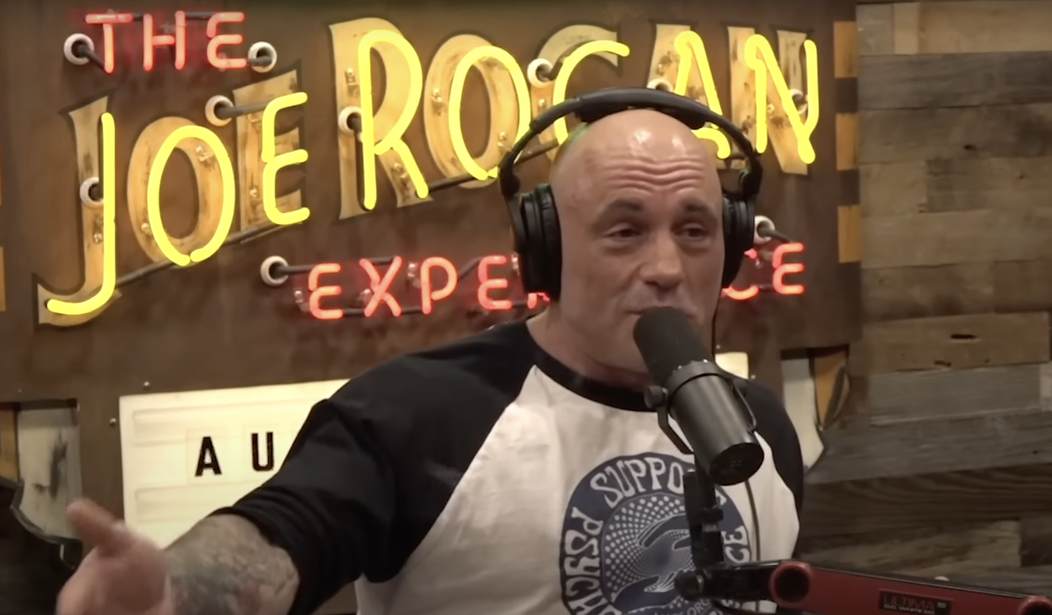Joe Rogan’s podcast "The Joe Rogan Experience" is now the world’s most important platform for conservatives. It wasn’t always this way, of course. For most of the last quarter-century, the FOX News Channel was the ultimate forum for reaching a conservative audience, but the FNC lost its monopoly in the fallout of the 2020 election, #MeToo upheaval, and loss of marquee personalities. The “must-see” baton has now been passed from Rupert Murdoch to the 57-year-old Rogan.
It’s a strange pairing because Rogan isn’t anywhere close to being a conservative. Nor is he even a moderate. In fact, if he were on the air in the 1990s or 2000s, he’d be the most liberal media personality anywhere on television: He supports gay marriage, drug legalization, legal abortions, criminal justice reform, and increased social spending. He’s supported the universal basic income and has even backed Bernie Sanders for president. Just a few decades ago, these positions would fall well outside of the mainstream. Nowadays, they barely qualify for a raised eyebrow.
Rogan is a useful barometer of how far to the left America has shifted. But with his shaved head, buff physique, tattoos, and fascination with mixed martial arts and hunting, he projects a conservative vibe — a right-of-center ethos. In the minds of uninformed liberals, Rogan “passes” for a conservative; therefore, he must secretly be one.
And therefore, he must be destroyed.
The mainstream media has targeted Rogan for destruction because he’s committed three cardinal sins: He’s way more popular than them; he contradicts what they claim; and he platforms people whose opinions they object to. The ferocity of their attacks has varied from legitimately criticizing Rogan for (occasionally) botching key facts or parroting unsupported claims, to out-and-out character assassination.
Oddly, the more the media attacked Rogan, the more conservatives rallied to his defense — deciding he must be one of us. And the more conservatives rallied to his defense, the more the media attacked him. It’s become a vicious circle — a self-fulfilling prophecy — that’s exacerbated the cultural divide between the left and the right.
Joe Rogan isn’t really a pundit or a commentator. He has strong opinions on a few controversial issues, particularly gender identity and mandatory vaccinations, but he’s not politically wired. It’s just not that important to him. Instead, Rogan would rather speculate about UFOs, debate combat sports, and explore the benefits of getting stoned. But politics has become such an all-encompassing part of our daily life that it looms large over everything. Post-COVID, our world’s gotten hyper-political, and "The Joe Rogan Experience" is no exception.
The best way to categorize Rogan is as a conversationalist. His show isn’t a platform for him to get on a soapbox and preach to the masses, but an opportunity to have a longform (often 3+ hours) interview with the scientists, celebrities, comedians, and kooks that he finds fascinating. One show might feature a deep dive into the evolutionary history of North American animals. The next might be Joe Rogan and a buddy drinking beer, smoking pot, and trying to make one another laugh. Despite his tatted exterior, there’s a sweetness to Rogan — an intrinsic likeability — that keeps you engaged. He’s the kind of guy you’ve gotta go out of your way to hate.
His guest list is extraordinary. It’s a virtual who’s who of anyone and everyone. Rogan has declined guests in the past, including Donald Trump, which only adds to the exclusivity of his podcast. For most national shows, producers and bookers must be pitched and wooed; it’s how we get new talent on TV. Not so with "The Joe Rogan Experience": It’s an insanely influential outlet that’s still being run like a mom-and-pop startup. Rogan does most of the booking on his own.
If you need to publicize a message in 2024, there’s no better platform on the planet. It’s not perfect, however: Rogan frequently repeats himself, and sometimes, his attentiveness noticeably wanes. Occasionally, it seems like he’s more interested in propping up his acolytes — which include Lex Fridman, Tim Dillon, Shane Gillis, Tony Hinchcliffe, and others — than covering new ground. The best way to consume his content is probably to play it in the background while you’re doing something else, and then check back intermittently. When the conversation gets good, you stay; when it gets boring, you wander away.
But for disseminating messages, this is the #1 place to be. What Johnny Carson was to up-and-coming comedians in the 1970s and 1980s, and what the FOX News Channel was to conservatives a decade ago, is the role Rogan has assumed in 2024. He’s our country’s most important tastemaker. Ignore him, and your messaging will suffer.
GRADE: A
Prior Commentators Critiqued:










